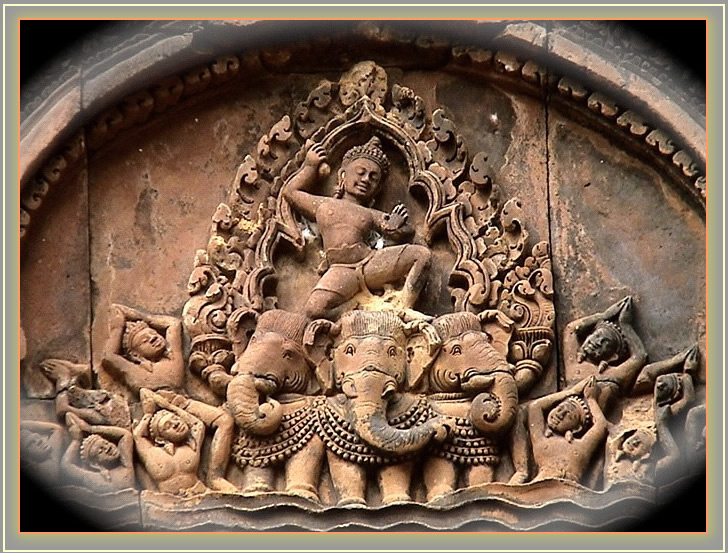Chapter 24: Krishna Defies Indra in Favor of the Brahmins, the Cows and Govardhana Hill
(1)
S'rî S'uka said: 'The Supreme Lord
staying in that very place [of Vraja] accompanied by Baladeva also, saw
how the gopas were very busy arranging for a sacrifice to
Indra. (2) Even though the Supreme Lord, the Soul of
All Seeing All, knew what that meant [see B.G.
9: 23], bowed He down humbly
and inquired He with the elders lead by Nanda [His stepfather]: (3) 'Tell Me, dear father, what all this fuss is
you're put up with, were does it lead to, for whom is it done and by
what means is this sacrifice to be accomplished? (4) Please tell Me about it, I have this great
desire to hear that from you o father; surely can the activities found
here of the saintly equal to all - equal in what is theirs or of others
or who is a friend and enemy or neutral - not be something to be
secretive about, is it? (5) An indifferent
person is just like an enemy to be avoided while an ally is to be
treated like one's own self so they say. (6)
People perform these activities very well knowing what they do, but
also when they have no clue; for those who in wisdom know what they do
can the perfection be found with the labor one performs, but for the
foolish without any notion is that perfection not in view. (7) That being so, I ask you, whether this
conjoint action of yours is something that is prescribed [in the
scriptures] or just a custom; that you should explain clearly to Me.'
(8) S'rî Nanda said: 'The rain its great lord is Indra, the clouds are his personal representatives, they provide the rain for all living beings which, just like milk, is the gratifying life-force. (9) For his liquid discharged do we and other people too with various items and fire sacrifices worship him, that master controller of the clouds, my dear son. (10) With the remnants of that sacrificing people sustain their lives the threefold way [religiously, economically and sensually]; he is the superhuman being bringing the fruits to those who in their human actions are after results. (11) Anyone who rejects this religious duty that was handed down by tradition is a person who because of lust, enmity, fear and greed for certain cannot achieve the splendor [of God, see B.G. 10: 36].'
(8) S'rî Nanda said: 'The rain its great lord is Indra, the clouds are his personal representatives, they provide the rain for all living beings which, just like milk, is the gratifying life-force. (9) For his liquid discharged do we and other people too with various items and fire sacrifices worship him, that master controller of the clouds, my dear son. (10) With the remnants of that sacrificing people sustain their lives the threefold way [religiously, economically and sensually]; he is the superhuman being bringing the fruits to those who in their human actions are after results. (11) Anyone who rejects this religious duty that was handed down by tradition is a person who because of lust, enmity, fear and greed for certain cannot achieve the splendor [of God, see B.G. 10: 36].'

(31) S'rî S'uka said: 'Hearing these words by the Supreme Lord, by the Time in person, spoken with the intent to break the pride of Indra, accepted Nanda and the elder men them as excellent. (32-33) And so they executed all that Madusûdhana spoke of: they settled for the successful course of reciting with the items available; the hill, the brahmins they all together respectfully paid tribute; the cows, bulls and calves were presented with grass and then was the circumambulation of the hill performed. (34) The cowherd women nicely ornamented riding wagons yoked with oxen sang, together with the twice-born chanting their benedictions, the glories of S'rî Krishna. (35) Then, to instill faith in the gopas, assumed Krishna another form saying 'I am the hill' and devoured He the abundance of offerings with the immensity of His body [see vapu and footnote*]. (36) Unto Him together with the people of Vraja brought He by Himself to Himself His obeisances: 'Oh, just see, how this hill manifest in person has bestowed upon us the mercy!'

